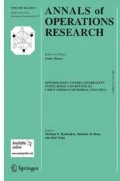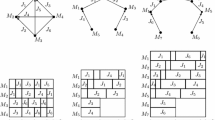Abstract
The paper deals with the determination of an optimal schedule for the so‐calledmixed‐shopproblem when the makespan has to be minimized. In such a problem, some jobs havefixed machine orders (as in the job‐shop), while the operations of the otherjobs may be processed in arbitrary order (as in the open‐shop). We provebinary NP‐hardness of the preemptive problem with three machines and three jobs(two jobs have fixed machine orders and one may have an arbitrary machine order).We answer all other remaining open questions on the complexity status of mixed‐shopproblems with the makespan criterion by presenting different polynomial and pseudopolynomial algorithms.
Similar content being viewed by others
References
S.B. Akers and J. Friedman, A non-numerical approach to production scheduling problems, Oper. Res. 3(1955)429-442.
P. Brucker, An efficient algorithm for the job-shop problem with two jobs, Computing 40(1988)353-359.
P. Brucker, A polynomial algorithm for the two machine job-shop scheduling problem with fixed number of jobs, OR Spektrum 16(1994)5-7.
P. Brucker, Scheduling Algorithms, Springer, 1995.
P. Brucker, S.A. Kravchenko and Yu.N. Sotskov, On the complexity of two machine job-shop scheduling with regular objective functions, OR Spektrum 19(1997)5-10.
P. Brucker, S.A. Kravchenko and Yu.N. Sotskov, Preemptive job-shop scheduling problems with a fixed number of jobs, Osnabrück Schrift. Math. Reihe P, Heft 184, Univ. Osnabrück, Osnabrück, 1996.
M.R. Garey and D.S. Johnson, Computers and Intractability: A Guide to the Theory of NP-Completeness, W.H. Freeman, 1979.
T. Gonzalez and S. Sahni, Open shop scheduling to minimize finish time, J. Assoc. Comput. Mach. 23(1976)665-679.
R.L. Graham, E.L. Lawler, J.K. Lenstra and A.H.G. Rinnooy Kan, Optimization and approximation in deterministic sequencing and scheduling: A survey, Ann. Discrete Math. 5(1979)287-326.
J.R. Jackson, An extension of Johnson's result on job lot scheduling, Naval Res. Logist. Quart. 3(1956)201-203.
S.A. Kravchenko and Yu.N. Sotskov, Optimal makespan schedule for three jobs on two machines, Z. Oper. Res. 43(1996)233-238.
J.K. Lenstra and A.H.G. Rinnooy Kan, Computational complexity of discrete optimization problems, Ann. Discrete Math. 4(1979)121-140.
T. Masuda, H. Ishii and T. Nishida, The mixed shop scheduling problem, Discrete Appl. Math. 11(1985)175-186.
N.V. Shakhlevich and Yu.N. Sotskov, Scheduling two jobs with fixed and nonfixed routines, Computing 52(1994)17-30.
Yu.N. Sotskov, Optimal scheduling two jobs with regular criterion, in: Automating the Design Processes, Institute of Engineering Cybernetics, Minsk, Belarus, 1985, pp. 86-95 (in Russian).
Yu.N. Sotskov, The complexity of shop-scheduling problems with two or three jobs, European J. Oper. Res. 53(1991)326-336.
Yu.N. Sotskov and N.V. Shakhlevich, NP-hardness of shop-scheduling problems with three jobs, Discrete Appl. Math. 59(1995)237-266.
V.A. Strusevich, Two-machine super-shop scheduling problem, J. Oper. Res. Soc. 42(1991)479-492.
Rights and permissions
About this article
Cite this article
Shakhlevich, N., Sotskov, N. & Werner, F. Shop‐scheduling problems with fixed and non‐fixedmachine orders of the jobs. Annals of Operations Research 92, 281–304 (1999). https://doi.org/10.1023/A:1018943016617
Issue Date:
DOI: https://doi.org/10.1023/A:1018943016617




